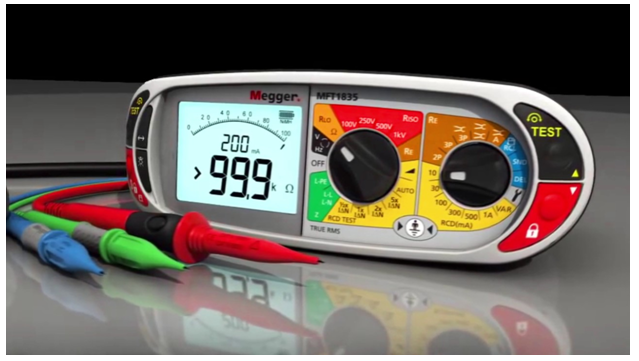Tester 1. All the UK functions plus a two times RCD test.

Tester 1. All the UK functions plus a two times RCD test.

It was an Australian website the MFT1800 series tester came up on, being sold in Australia and New Zealand and of course the MFT70 on an American website.
I was actually looking at the earth rod testing accessories for my MFT1741 last night, some years ago I bought a secondhand dedicated three wire earth rod tester without any test leads or spikes.
Having purchased the test leads and spikes I have used it a few times, but having bought the MFT1741 really I should sell the earth tester but keep the leads and spikes to use with the MFT, as I have testers I don’t actually need.
Which is how I came to be looking at Megger MFTs last night, I don’t think I will be rushing to buy the clamps for stake-less testing already having a set of leads and spikes.
www.test-meter.co.uk/megger-mft1741-multifunction-tester-choice-of-kit
It was an Australian website the MFT1800 series tester came up on, being sold in Australia and New Zealand
But, oddly, if you have a look at AS/NZS 3000, to the best of my knowledge there is no requirement for a formal "tripping time" instrument test of RCDs at present (although there is nothing to say the test can't be done with an instrument).
Which is how I came to be looking at Megger MFTs last night, I don’t think I will be rushing to buy the clamps for stake-less testing already having a set of leads and spikes.
The full stake-less testing (2-clamp) using VCLAMP and ICLAMP is really good. Only injects < 1 mA into a resistance of 40 ohms or so.
When many installations in urban areas require electrodes (recommended for TN systems now, but would be necessary if you have island mode capability because of Regulation 551.4.3.2.1) I think it's a far better and safer option than a loop impedance measurement to the electrode (think about trying to find 30 to 50 m of ground to carry out an n-stake test).
I think John Peckham has his own favourite devices for stake-less testing, though. There are certainly some models out there for stand-alone testers which have both voltage injection and current measurement clamps built into one set of jaws.
It was an Australian website the MFT1800 series tester came up on, being sold in Australia and New Zealand
But, oddly, if you have a look at AS/NZS 3000, to the best of my knowledge there is no requirement for a formal "tripping time" instrument test of RCDs at present (although there is nothing to say the test can't be done with an instrument).
Which is how I came to be looking at Megger MFTs last night, I don’t think I will be rushing to buy the clamps for stake-less testing already having a set of leads and spikes.
The full stake-less testing (2-clamp) using VCLAMP and ICLAMP is really good. Only injects < 1 mA into a resistance of 40 ohms or so.
When many installations in urban areas require electrodes (recommended for TN systems now, but would be necessary if you have island mode capability because of Regulation 551.4.3.2.1) I think it's a far better and safer option than a loop impedance measurement to the electrode (think about trying to find 30 to 50 m of ground to carry out an n-stake test).
I think John Peckham has his own favourite devices for stake-less testing, though. There are certainly some models out there for stand-alone testers which have both voltage injection and current measurement clamps built into one set of jaws.
We're about to take you to the IET registration website. Don't worry though, you'll be sent straight back to the community after completing the registration.
Continue to the IET registration site